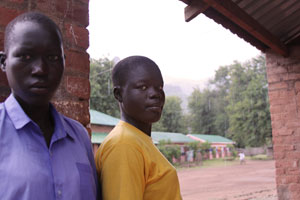
Students at Saint Augustine’s secondary school in South Sudan, where girls often have little chance to get an education. Secours Catholique built a girls’ dormitory for the school.
Credits: Sheahen/Caritas
By Laura Sheahen
“Some girls run here and tell Sr Pasquina that their family wants to marry them off by force.” Rita Amone is talking about young women in Isoke, a small town in the southeastern corner of South Sudan.
At the primary school where Amone is a teacher, girls go to school. But the older they get, the more likely their education will be seen as an expense and a burden to their families, who receive cows as a bride price if the girls marry instead.
“When the girl reaches age 15, the parents can get cattle from an old man,” says Amone. “They feel the girls are wealth.” There are other reasons the girl might be married at a young age. “If my brother kills someone, if I am a girl, I am picked and given to the victim’s family,” she says, adding that if they resist “they’ll beat you up. You don’t have any voice. You follow what the men say. If I cause problems, they might kill me.”
In other cases, the long war that engulfed this young east African nation kept girls from going to school. “Some girls don’t get an education if they’ve been hiding in caves and mountains, those who took refuge outside the town,” says Amone. Girls who manage to stay in school sometimes have to fund their education “by the main way a woman earns money here: making kwete, local alcohol,” says Elizabeth Hodgkin, a volunteer in Isoke.
Girls in South Sudan have a greater chance of dying in childbirth than they do of finishing school. This is not only because South Sudan has very poor healthcare, but also because girls who give birth before they are 16 are five times more likely to die than women in their twenties.
When young women fleeing forced marriage go to Sr Pasquina, a Catholic nun who serves the people of Isoke, “they’d stay at the convent with the sisters. Sr Pasquina talks to the parents,” says Amone. Sometimes she can convince them to let their girls stay in school. “Other times the parents take them back home.”
Sr Pasquina recalls the story of Clara*, who is now about 15. When she was eight, her father demanded that she be taken out of the primary school she was going to in a place called Hiriavit; he wanted her to look after his second wife’s children. Clara’s mother refused, urging that her daughter be allowed to stay in school. The father killed the mother, who was pregnant at the time. He then threatened to kill all of his wife’s five daughters including Clara, saying he didn’t want girls.
Villagers took the girls to Saint Kizito’s, Isoke’s primary school. There, they could get an education and also be protected from their father. But last year the father arranged for Clara to marry an older man. The school refused, hiding her first in the school and then in a mountain village. The Catholic sisters now pay for Clara to go to a school in Uganda, while two of the other girls are with their grandmother and two are in an orphanage.
Caritas has long played a role in Isoke. Caritas Belgium and Secours Catholique (Caritas France) have helped both Saint Kizito’s and the secondary school Saint Augustine’s, renovating classrooms and building dormitories. Recently, Secours Catholique funded a girls’ dormitory for Saint Augustine’s. Because of it, young women who might have lost out on schooling have more options.
Today, the cheerful pink dormitories house the girls who made it this far, and will hopefully make it farther. As South Sudan struggles to grow and flourish, helping its schools will keep girls safe–and ensure that both boys and girls get an education.
*Name has been changed.
